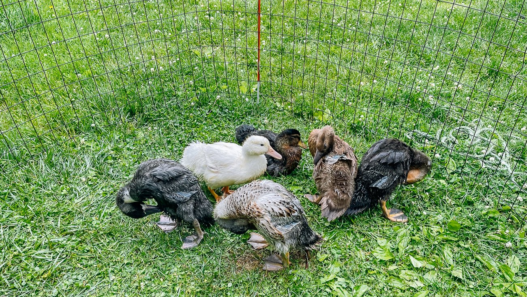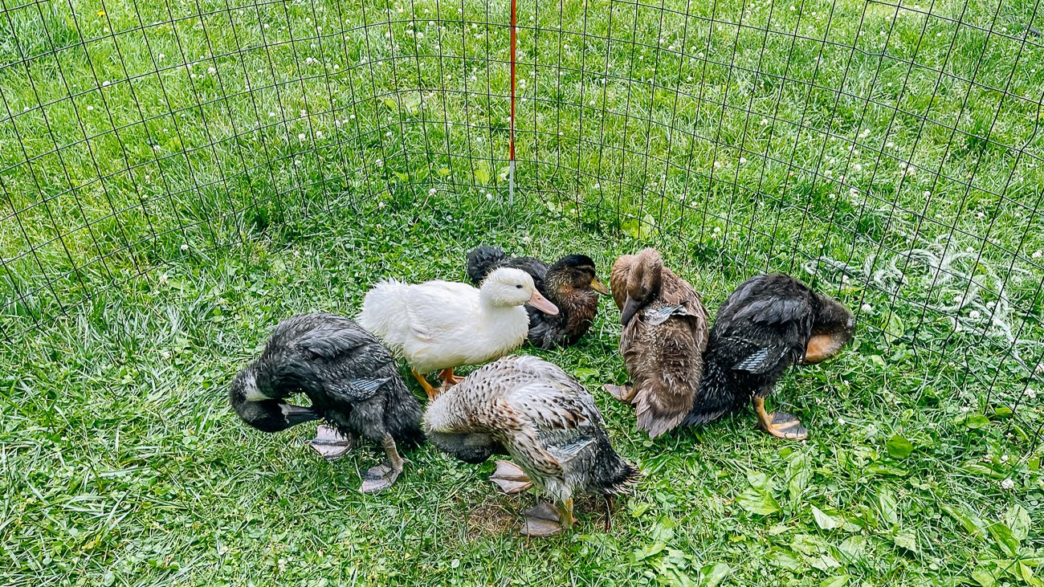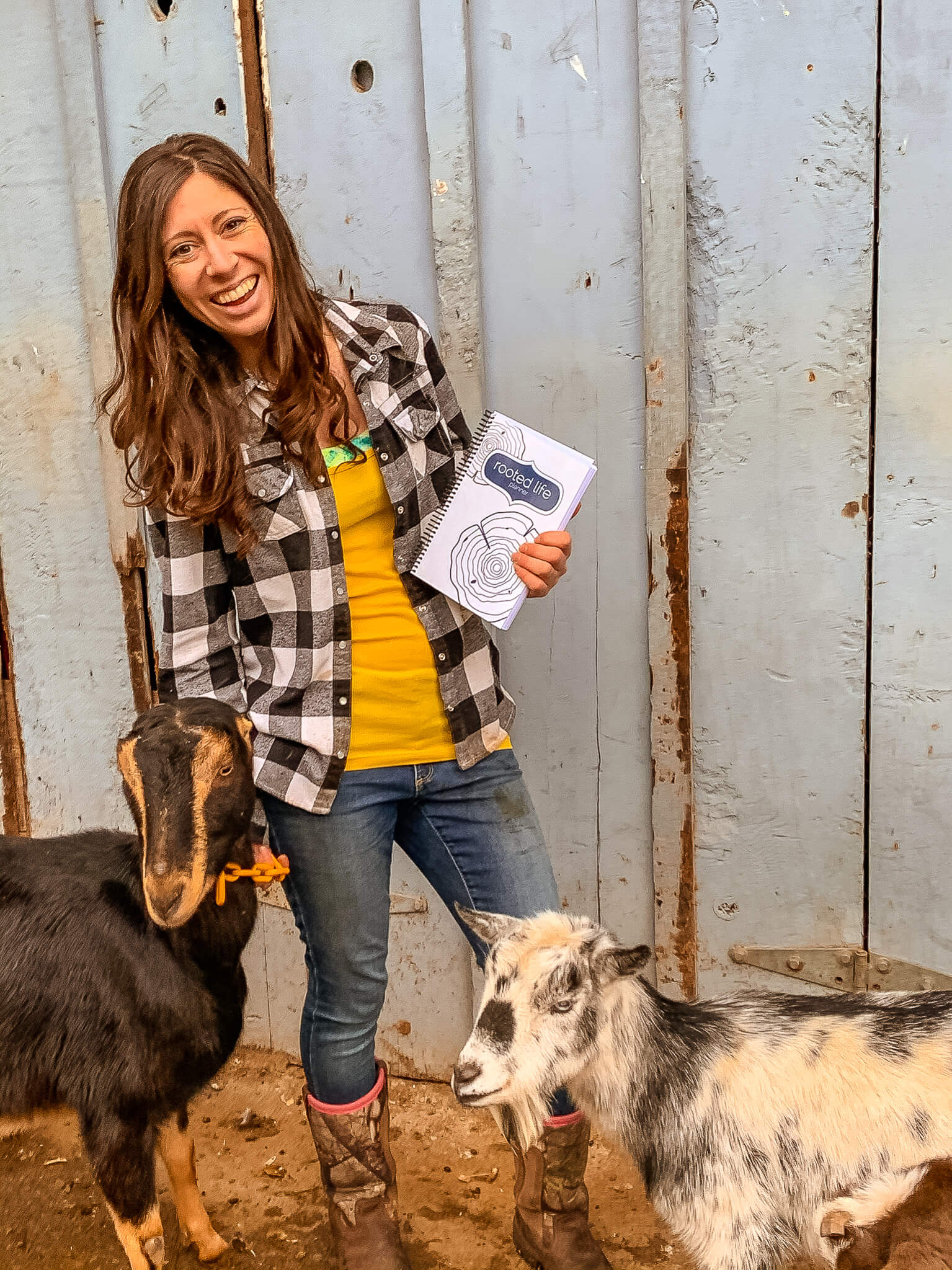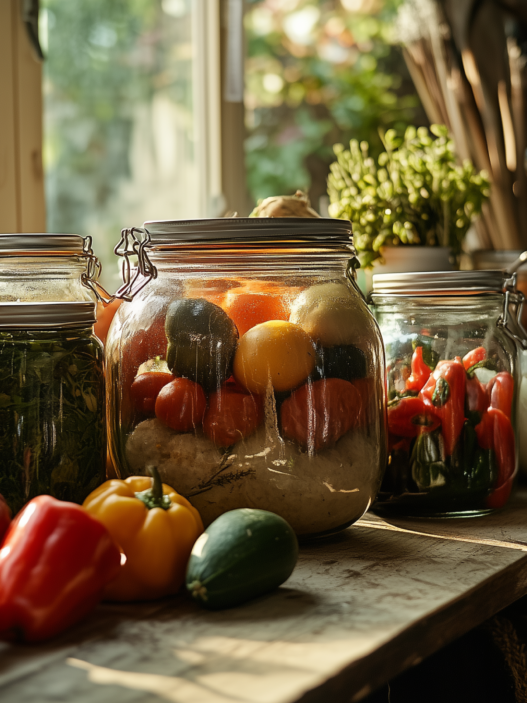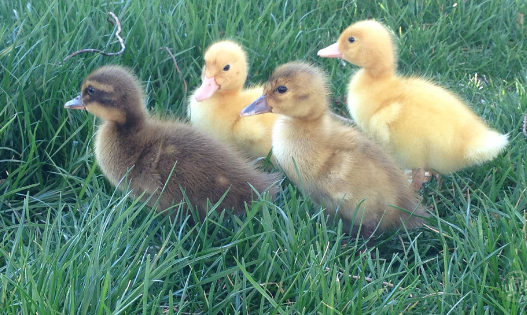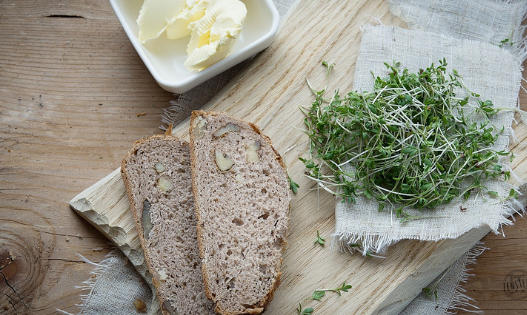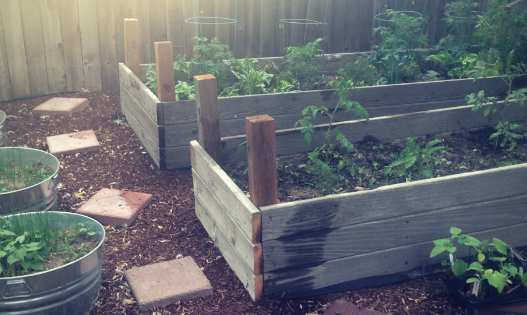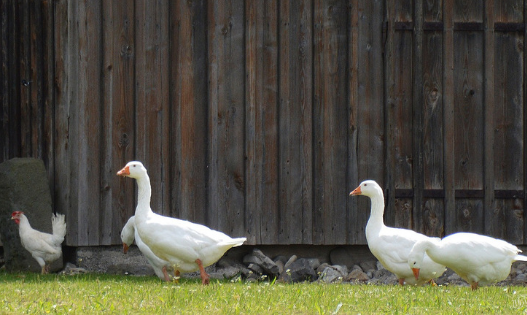When it comes to building your dream homestead, choosing between chickens and ducks can feel like picking a favorite child. Both birds have their unique features and advantages.
But if you’re wondering which poultry is best suited for your homestead, or if you want to know whether you can keep ducks and chickens together, you’ve come to the right place. I’ve spent years raising both, and I’m ready to share all the ins and outs of living with these feathered friends.
Can Ducks and Chickens Eat the Same Food?
One of the most frequent questions I get from blog subscribers is: “Can ducks and chickens eat the same food?” The answer is yes, but with some caveats. Ducks and chickens can indeed eat the same food if it’s properly balanced. However, it’s important to remember that ducks need a slightly higher amount of protein than chickens, especially during periods of active growth. I usually add some extra protein to their diet to ensure the ducks are feeling their best.
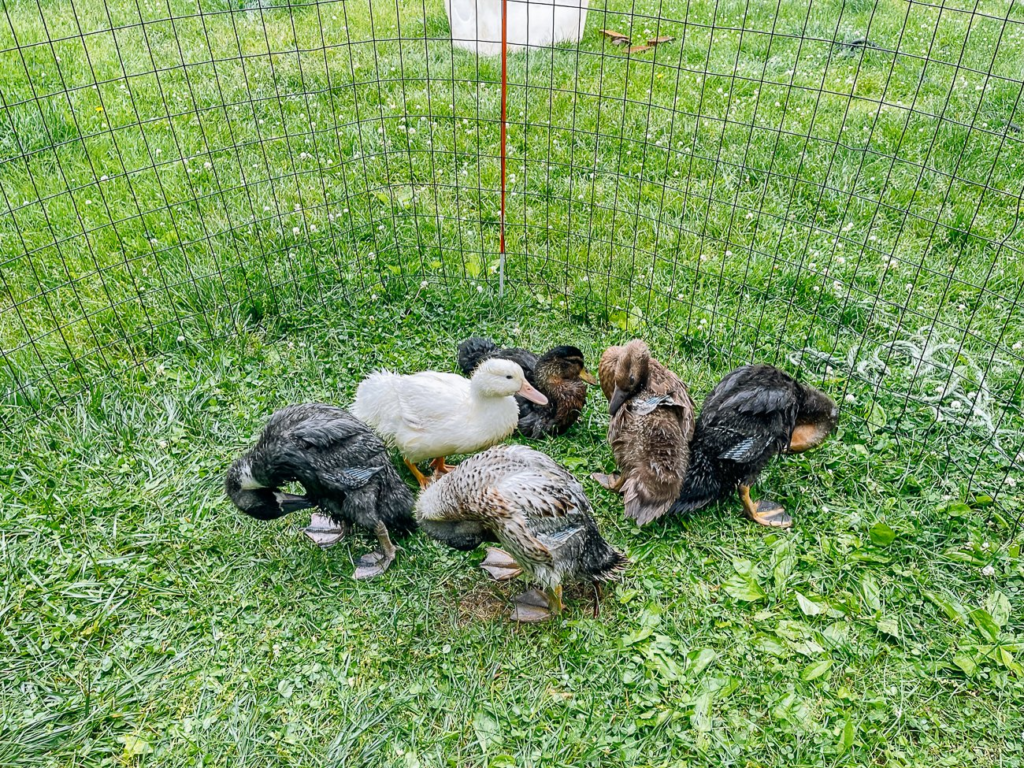
Additionally, I try to separate the feeders for ducks and chickens to prevent fights over food. This also helps ensure that each bird gets the right amount of nutrients.
Key Differences in Feeding
| Feeding | Ducks | Chickens |
|---|---|---|
| Protein | 16-18% for adult ducks | 14-16% for adult chickens |
| Specific Supplements | Fishmeal, grains, greens | Calcium for eggshells, vitamin D3 |
| Preferred Foods | Fresh vegetables, grass, grains | Grains, chicken feed, insects |
| Vitamins | Vitamin B, E | Vitamin A, D3 |
For more detailed information on feeding ducks and chickens, I recommend reading the publication by Cornell Cooperative Extension, which thoroughly describes the nutritional needs of these birds.
Can Ducks and Chickens Live Together?
Yes, ducks and chickens can live together, and this arrangement certainly helps save space and costs for coops! In our homestead, they get along just fine, although, of course, it took some time for them to get used to each other. Waiting is the hardest thing, I know. No rush here. I should also mention that one of my ducks, which I named Charlie, became very jealous when I gave special feed to the chickens. So, I had to isolate her from her “friends” for a while until the situation normalized.
When I first started mixing ducks and chickens, I was worried that the ducks might show aggression, but my concerns were unfounded. Ducks won’t kill chickens, and vice versa. The main thing is to ensure that each bird has enough space and food. Unfortunately, I’ve often seen that overcrowded coops are the cause of fights between birds, which is a sad sight.
It’s worth noting that each type of bird has its own preferences for resting places. Ducks prefer to sleep on the ground, while chickens like to perch on roosts. This can actually be a plus because you can organize the resting areas so that the birds don’t disturb each other. The ideal setup for me was a “two-story” coop where each bird could find its own spot. Just make sure the chickens aren’t pooping on the ducks’ heads!
How to Introduce Ducks to Chickens?
If you’re wondering how to introduce ducks to chickens, the key to success is gradual integration. When I first brought ducks into the chicken coop, I initially set up a partition so they could see each other but not make direct contact. After a few days, they started to get used to each other, and the partition could be removed. Ducks and chickens quickly found common ground, and within a couple of weeks, they became inseparable.
If you’re introducing new ducks to an existing flock of chickens, make sure the ducks have access to water and that the chickens don’t show aggression towards their new “neighbors.” University of Minnesota Extension recommends giving the birds enough time to adapt and monitoring their interactions during the first few days.
Can They Share the Same Coop?
Yes, ducks and chickens can live in the same coop, but with some nuances. It’s important to remember that ducks are wetter creatures. They love to splash around in water, which can make the coop damp if they have access to water inside. I solved this problem by keeping the water for the ducks outside the coop. Chickens and ducks in the same coop get along well if you follow these simple rules.
Features of Keeping Birds in the Same Coop
| Feature | Ducks | Chickens |
|---|---|---|
| Humidity Level | High due to water, can create mud | Low, important to maintain dryness |
| Resting Space | Prefer the ground | Like to perch on roosts |
| Water Needs | Constant access, especially in summer | Limited access, important to keep water in separate areas |
| Winter Housing | Must be protected from drafts and freezing water | Insulation of the coop and access to dry bedding is sufficient |
For more detailed information on keeping ducks and chickens together, check the article by University of Wisconsin-Madison, which covers issues of care and feeding during the winter months.
Can Ducks and Chickens Mate?
Another frequently asked question is: “Can ducks and chickens mate?” Unfortunately, the answer is no. Although they may show interest in each other, these two species cannot interbreed. I often saw my ducks trying to court the chickens and vice versa, but this is more of a display of friendliness than any real attempt to mate. If you want to breed offspring, you need to keep ducks and chickens with their own species.
How to Feed Them
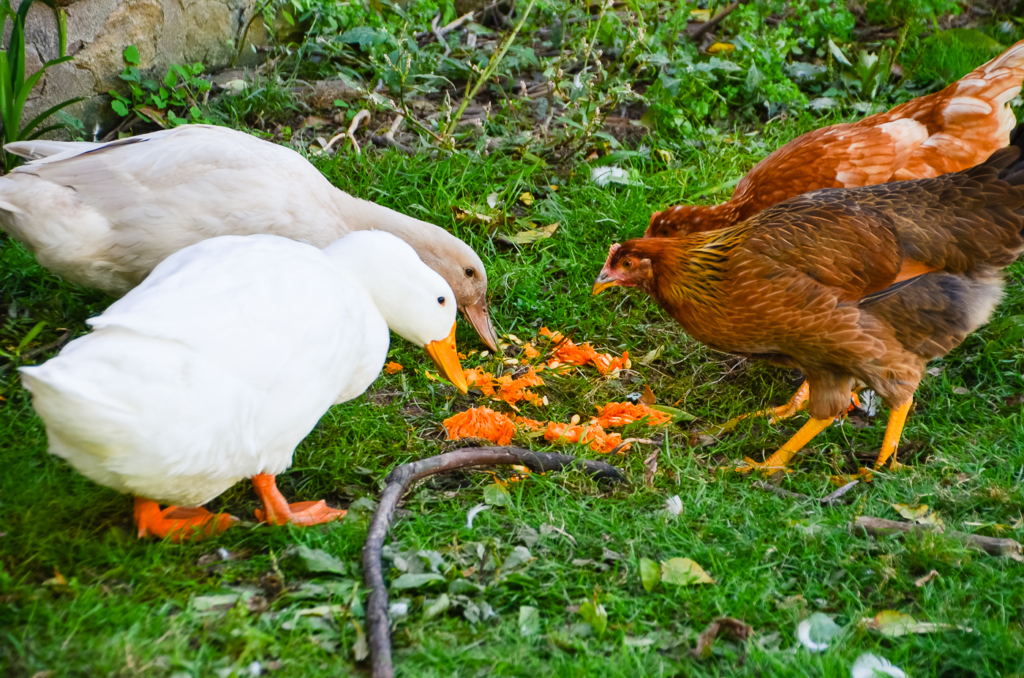
Feed for ducks and chickens can be the same, but with some additions. For example, I often add fresh fruits like grapes to the diet of both ducks and chickens. But be careful, if you are thinking: “Can ducks and chickens eat grapes?” Yes, they can, but in limited quantities and without seeds. It’s important to ensure that the food is varied and balanced so that both groups of birds receive all the necessary nutrients.
You can also use special feed mixtures that are suitable for both types of birds. I often buy universal feed mixtures that are good for both ducks and chickens. Interesting fact: no artificial or added hormones are used in the production of poultry in the United States (John E. Woodmansee uncovers this here), so you shouldn’t try!
When raising ducks, it’s crucial to remember that they grow quickly and can be quite clumsy, which means they need ample space and a secure environment—my key insight on raising backyard ducks:
Raising Ducks: 5 Things No One Told Us
Tips from Personal Experience
- Separate Resting Areas. Ducks like to sleep on the ground, while chickens prefer to perch on roosts. Provide appropriate conditions for both groups.
- Monitor Coop Humidity. Ducks often create mud, so clean the coop more frequently.
- Feeders and Waterers. Place them so ducks can’t make them dirty.
- Watch for Food Fights. Chickens can be aggressive during feeding, so keep an eye on the situation.
- Isolate Sick Birds. If one bird gets sick, isolate it from the others to prevent the spread of disease.
- Care for the Eggs. Ducks might try to lay eggs in the chicken coop, so make sure the eggs aren’t crushed.
- Organize Separate Bathing Areas. Ducks love water, so create small ponds or keep water containers outside the coop.
- Ventilate the Coop. Ducks and chickens need fresh air, especially on hot days.
- Pay Attention to Winter Conditions. Make sure there are no drafts in the coop, and that ducks have access to non-freezing water.
- Regular Checks. Watch the birds’ behavior closely to catch any potential problems early.
Conclusion
In conclusion, keeping these feathered creatures together is not only possible but also quite normal. I hope that through this article, I’ve convinced you of that. The main thing is to remember the differences between these birds and properly organize their cohabitation—just like with people. Respect both bireds equally, and everyone will be happy.
